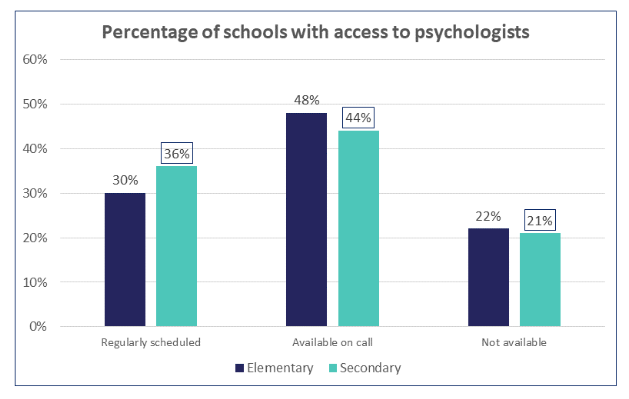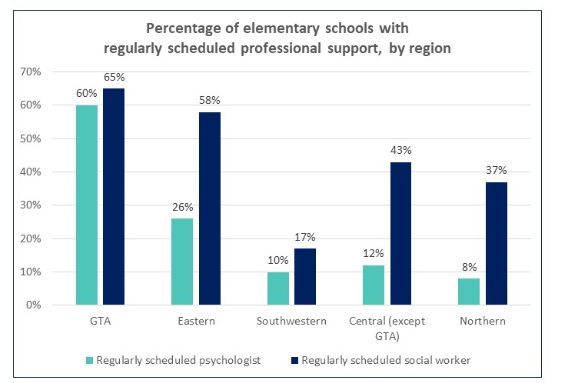Supporting students’ mental health: A collective responsibility
Principals across Ontario are facing increasing challenges in meeting the needs of students struggling with mental health issues.
A new report from People for Education, Supporting students’ mental health: A collective responsibility, also shows that there are substantial regional disparities across Ontario in access to supports such as social workers, psychologists, and child and youth workers.
Based on survey responses from 1254 schools from across Ontario, the report says that many principals are concerned that students’ challenges are beyond the training and capacity of educators and staff.
The latest People for Education report, Supporting students’ mental health: A collective responsibility, highlights again the urgent need to ensure that the best trained and qualified professionals are available in an equitable manner to provide supports to our students and their families as they address issues of mental health.
Catholic Principals’ Council of Ontario
Access to psychologists on the decline
Principals responding to the Annual Ontario School Survey reported that psychologists, social workers, and child and youth workers are key resources for supporting student mental health, but most are only available a hew hours a week. They also raised concerns that existing mental health supports tend to focus on managing crisis situations rather than fostering positive mental health. Along with specialists, principals say that there is an ongoing need for professional development for teachers.
Among the findings in the report:
- There has been a decline in the proportion of schools with regular access to psychologists. This year, only 30% of elementary schools and 36% of secondary schools report having regularly scheduled access to a psychologist, down from 38% and 40% respectively in 2017.
- Even in schools with regular access to psychologists, they are only available for an average of approximately five hours per week.
- The proportion of schools reporting no access to psychologists has nearly doubled in the last five years.
- While 80% of secondary schools have regular access to social workers, only 48% of elementary schools do. And in those schools, social workers are available for an average of 16 hours a week in secondary schools, and 5 hours per week in elementary schools.
Geographic inequities
Data from the survey show that schools in Northern and Southwestern Ontario are much less likely to have access to mental health supports, than schools in the GTA. Principals in French-language systems also expressed concerns that their francophone communities are underserved when comes to mental health and that access to francophone professionals is an issue.
The high cost of unaddressed mental health needs
The report points to research showing that the majority of mental health disorders emerge during childhood and adolescence and that there is widespread agreement that prevention and early treatment of mental illness has long-term payoffs. Conversely, untreated mental health issues lead to a wide range of negative educational outcomes including poor academic achievement, missed classes and a higher drop out rate. Economic models show that promotion, prevention and early intervention yield sizable economic returns.
A “whole school” approach and greater connectivity with community resources needs proper support from government.
Charles E Pascal, Professor OISE/University of Toronto & Former Ontario Deputy Minister of Education
Collaborative initiatives may provide pathways for improvement
There are a number of promising initiatives on the horizon, including #HearNowON—a project led by School Mental Health Ontario and supported by the Ontario Student Trustees’ Association. This initiative, launched in the spring of 2019 with an extensive student survey and in-person meetings with students, is intended to “hear student voices, improve youth engagement in school-based mental health programming, and inform a provincial student mental health leadership strategy.”
According to Dr. Kathy Short, Executive Director of School Mental Health Ontario, “Schools are an excellent place to promote student mental health, to build knowledge about social-emotional skills, and to identify and support students early who may struggle with a mental health problem.”
Now more than ever, the mental health and well-being of Ontario children and youth should be a priority. When kids are treated on time and with the right mental health resources and support, they have the best outcomes.
Kimberley Moran, CEO, Children’s Mental Health Ontario
Recommendations for change
In the report, People for Education made a number of recommendations to the provincial government.
- Continue to revise Ontario curriculum to embed teaching and learning about the range of skills and competencies, including social-emotional skills, that provide students with the knowledge and understanding they need to promote good mental health.
- Update the Education Funding Formula to ensure that schools in rural areas and the north, as well as French-language schools are able to provide students with equitable access to mental health professionals and supports.
- Consult with principals, teachers, and professionals across the province to develop long-term planning and policy that will support a whole school approach to mental health.
Read the full report: Supporting students mental health: a collective responsibility
